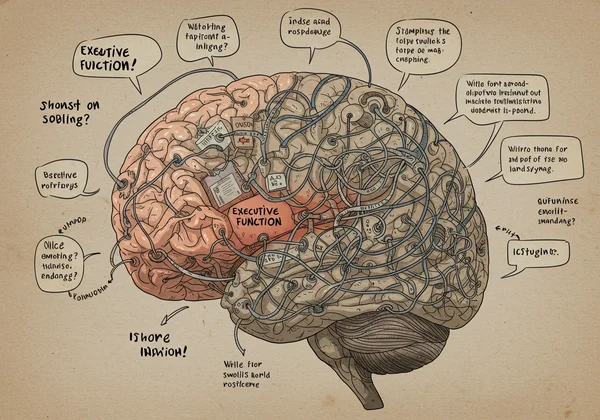ASRS Test: Supporting a Partner with Adult ADHD
October 27, 2025 | By Miles Harrison
Navigating a relationship can be complex, and it becomes even more so when you suspect your partner might be struggling with something beneath the surface. Are you often wondering why your partner struggles with focus, organization, or emotional regulation? You are not alone. This guide offers empathetic insights and practical strategies for understanding and supporting a loved one who might be showing signs of Adult ADHD. Discover how to navigate relationship challenges together and gently suggest exploring a confidential screening like the asrs test. What are the symptoms of ADHD in adults, and how do they impact a partnership?
Understanding these signs is the first step toward building a more compassionate and supportive connection. A great way to begin exploring these patterns is with a preliminary screening. You can take the free ASRS test on our site to get a better understanding.

Spotting the Signs: Adult ADHD in Your Partner
Recognizing the potential signs of ADHD in your partner is crucial. These behaviors are not character flaws or a lack of care; they are often manifestations of a neurodevelopmental condition. Observing them through a lens of understanding rather than frustration can transform your relationship dynamic.
Common Manifestations in Daily Life & Relationship Dynamics
In daily life, ADHD can appear as chronic disorganization or forgetfulness. Your partner might frequently misplace keys, forget important dates like anniversaries, or struggle to complete household chores. This can sometimes be misinterpreted as carelessness, leading to conflict. They may also have difficulty with time management, often running late or underestimating how long tasks will take. This isn't a lack of respect for your time, but a common challenge with what experts call executive function.
In the context of the relationship, this might mean they have trouble following through on promises or struggle to manage shared responsibilities. It’s important to see these actions not as intentional slights, but as symptoms that can be managed with the right strategies and support.
Beyond Distraction: Emotional & Communication Patterns
ADHD is more than just inattention. It profoundly affects emotional regulation and communication. You might notice your partner experiences intense mood swings or has an explosive temper over seemingly small issues. This is often linked to emotional dysregulation, a core component of adult ADHD. They may feel emotions more intensely and have a harder time returning to a calm baseline.
Communication can also be a challenge. Your partner might interrupt you frequently, not because they are rude, but due to impulsivity. They may also "zone out" during conversations, making you feel unheard. This is a symptom of inattention, not a lack of interest in what you have to say. Understanding these communication patterns is key to avoiding misunderstandings.
Understanding the "Why" Behind ADHD Behaviors
To truly support your partner, it helps to understand the neurobiological reasons behind their actions. This knowledge fosters empathy and shifts the dynamic from one of conflict to one of collaborative problem-solving. This is a journey you can start together by exploring a confidential ADHD self-assessment.
It's Not Willful: The Executive Function Challenge
Executive functions are the brain's management system, responsible for planning, organizing, initiating tasks, and regulating emotions. In individuals with ADHD, this system is impaired. When your partner fails to finish a project or forgets to pay a bill, it's not a matter of willpower or laziness. It's a genuine struggle with their brain's ability to execute complex tasks.
Think of it like a talented chef working in a disorganized kitchen. All the skills are there, but finding the right ingredients and tools at the right time is a constant battle. Recognizing this challenge allows you to work together on creating systems, like shared calendars or visual reminders, that support their executive function.

Navigating Emotional Dysregulation and Rejection Sensitivity
Many adults with ADHD experience something called Rejection Sensitive Dysphoria (RSD). This is an extreme emotional sensitivity and pain triggered by the perception of being rejected, teased, or criticized. A minor comment that you see as harmless might be perceived by your partner as a deep personal attack, leading to an intense emotional reaction.
Understanding rejection sensitivity is a game-changer. It helps you realize their strong reactions are not an overreaction in their internal world. This knowledge can guide you to communicate feedback more gently and provide reassurance, strengthening your emotional bond. It also highlights the importance of exploring these symptoms further through a reliable ASRS screening tool.
Empathetic Support: Helping Your Partner with Suspected ADHD
Once you understand the "what" and the "why," you can move on to the "how." Providing effective support is about creating a partnership where both individuals feel seen, heard, and respected. It’s about building a team to tackle challenges together.
Fostering Open and Non-Judgmental Communication
The foundation of support is open communication. Create a safe space where your partner can share their struggles without fear of judgment. Use "I" statements to express your feelings instead of "you" statements that can sound accusatory. For example, say, "I feel hurt when I have to remind you multiple times," instead of, "You never listen to me."
Schedule regular check-ins to discuss what's working and what isn't. Celebrate small victories and acknowledge the effort your partner is putting in. This positive reinforcement can build confidence and strengthen your connection.
Introducing the ASRS Test Online as a First Step
Approaching the topic of getting assessed can be delicate. Frame it as an act of care and a way to find solutions together. You could say, "I've been reading about how some people's brains work, and it made me think of us. I found this tool that might give us some insights. It’s completely private."
The Adult ADHD Self-Report Scale (ASRS) is a respected screening tool developed by the World Health Organization. It is not a diagnosis but a starting point. Suggesting an ASRS test online can be a low-pressure way to begin the conversation. The AI-powered report from our test can provide personalized insights that you can review together, paving the way for a more informed conversation with a healthcare professional.

Frequently Asked Questions
1. How accurate is the ASRS ADHD test?
The ASRS is a highly reliable screening tool developed by the World Health Organization (WHO) and researchers from Harvard Medical School. While it is not a diagnostic tool, it is scientifically validated to help identify adults who may have ADHD. A positive screening suggests that a further evaluation with a healthcare professional is a good idea. You can discover your ASRS test results privately and instantly on our platform.
2. What are the common symptoms of ADHD in adults?
Common symptoms fall into two main categories: inattention and hyperactivity/impulsivity. Inattention includes difficulty staying focused, disorganization, and forgetfulness. Hyperactivity/impulsivity can manifest as restlessness, talking excessively, interrupting others, and making hasty decisions. Many adults also experience significant emotional dysregulation.
3. Is it worth getting an ADHD diagnosis for my partner?
Yes, for many people, receiving a formal diagnosis is life-changing. It provides an explanation for lifelong struggles, reduces self-blame, and opens the door to effective treatment options, including therapy, coaching, and medication. A diagnosis can empower your partner to understand their brain better and develop strategies for success. Taking a preliminary online ADHD screening is a great first step in that journey.
4. How can I suggest an ADHD self-assessment without causing a fight?
Choose a calm, private moment and lead with empathy and concern. Frame it as a "we" issue, not a "you" problem. You could say, "I've noticed we've been struggling with [specific issue], and I want us to find solutions together. I came across a confidential online quiz that might give us some clarity." Emphasize that it's just for gathering information, not for labeling or blaming.
Your Path Forward Together
Understanding that your partner may have Adult ADHD is the beginning of a new chapter in your relationship—one built on deeper empathy, effective communication, and mutual support. The challenges are real, but so are the opportunities for growth and connection. By learning to navigate the unique aspects of their neurotype, you can build a stronger, more resilient partnership.

Remember, this journey starts with a single, gentle step. Taking a confidential and insightful screening can provide the clarity needed to move forward. We invite you and your partner to start your ASRS test today and unlock the personalized AI report that can guide your next conversation.